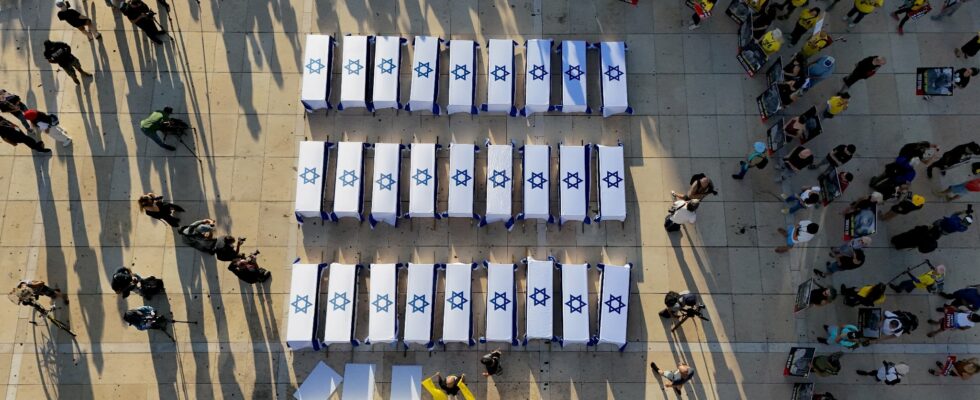Six Israeli hostages executed “at point-blank range” by Hamas were discovered by the Israeli army in a tunnel near Rafah. In the same tunnel, 20 meters deep, where the Israeli Bedouin hostage Kaid Farhan Alkadi was found alive. The IDF, which was trying to check if other hostages were being held nearby, stumbled upon the bodies of the six hostages. Alexander Lobanov (32), Carmel Gat (40), Almog Sarusi (27), Eden Yerushalmi (24), Ori Danino (25) and Hersh Goldberg-Polin (23). They were visiting their parents in Kibbutz Be’eri, living there, working or dancing at the Nova festival. They had been held hostage for 329 days. According to the Israeli Health Ministry, they bore the marks of torture.
If I specify the names, ages and conditions of the kidnapping of these six young Israelis, it is neither out of a morbid reflex nor in an attempt to draw tears from your eyes, dear reader. No, I specify, I detail, to keep them alive. To mark the fundamental difference between the Islamist doxa and humanist values, those which preside, which should preside in the democratic and liberal West. I specify because through their names is revealed a world where life counts, where each human life is a singularity, where each loss is mourned, where each death is honored for what it was, for what it accomplished, in the recognition of its individuality.
And I dare to hope that later, when he is old enough to understand, the five-month-old child of Alexander Lobanov, born while he was a hostage, will learn from those who loved him who his father was, what kind of individual he was, what kind of father he should have been. And I believe that he will not be told about his father as someone sacrificed for the cause, a cause greater than Man, a cause that crushes Man, as a pawn among many others, a symbol that he will have to avenge as an adult. He will not be told that he must become a martyr, an anonymous weapon for a cause.
Chilling smile
I don’t know if it was for the posturing, I don’t know if it was a number rehearsed for the gallery, but the chilling image of Ismail Haniyeh, political leader of Hamas before his assassination in Tehran, learning of the death of three of his sons, instantly came back to me as a negative memory. His satisfied smile and his contained but obvious joy that imagined his sons in paradise, far, so far from the land of men. Because this land is worthless. This land does not expect any return of any messiah. Sunnism is a non-messianic religion, there is nothing to expect on earth, no hope. The Shiites, who have a clergy and a gallery of twelve saints, are waiting for the return of the twelfth imam, the hidden imam, the mahdi. There is still something to come on earth – that’s something. But in the Sunni religion, nothing at all. The earth is doomed to be sin, a path of tears, a hell where life is worth less than death. Because death sends you immediately – and even more so if you are a martyr – to the kingdom of God, where everything that was forbidden on earth, joy, fornication, wine, is allowed in heaven. Rivers of wine and virgins. Eternal virgins, whose hymen is reconstituted after each sexual intercourse – which, by the way, is more like an eternal hell. It is then obvious for Ismaël Haniyeh to be happy about the death of his sons, because they escape the way of the cross on earth to reach the true life, that of heaven.
Life drive, death drive. This is the meaning of the war that Israel is waging against Hamas, and it is the greatest of Hamas’ traps – which could stop this war by returning the hostages, which could lay down its arms, but which prefers to sacrifice its population and place Israel in an untenable position by counting on the criminal intransigence of Benjamin Netanyahu to continue an existential war, certainly, but which puts the security of the Israelis and the lives of the hostages in the balance. This is a tragic error that taints humanist ethics. The hostages must return alive. This is existential, it is the only life drive that has the value of victory over the Islamist death drive.
Abnousse Shalmani, committed to fighting against identity obsession, is a writer and journalist
.
